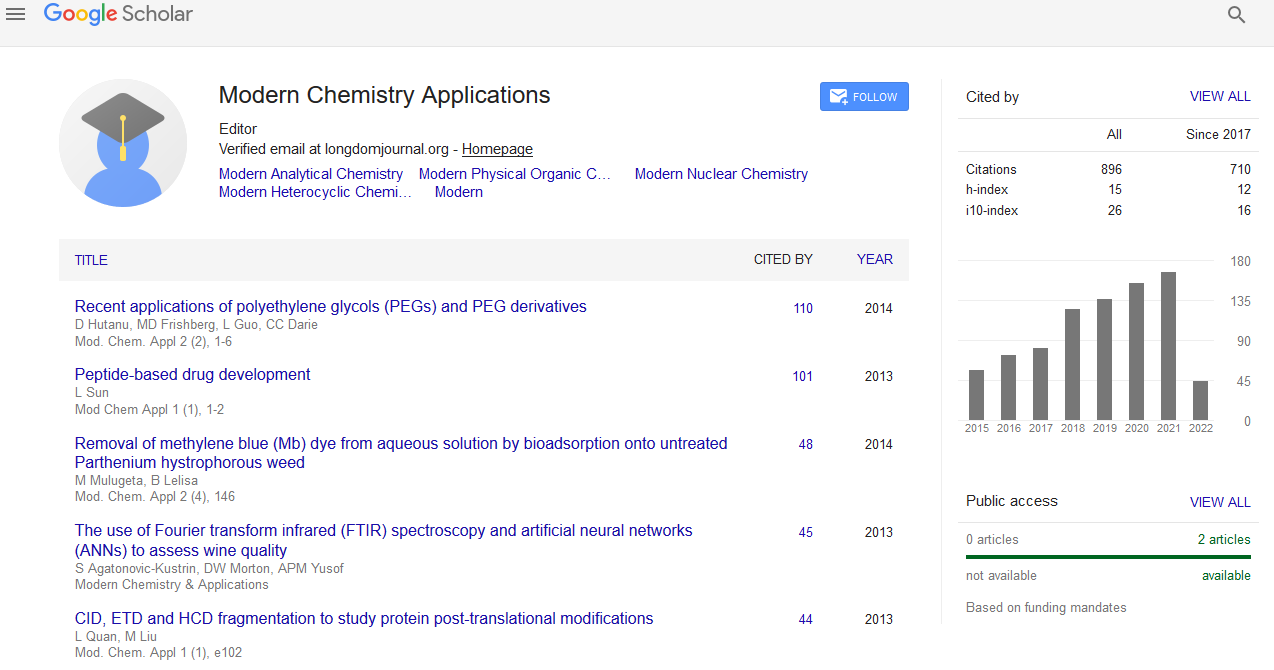Indexed In
- Open J Gate
- JournalTOCs
- RefSeek
- Hamdard University
- EBSCO A-Z
- OCLC- WorldCat
- Scholarsteer
- Publons
- Geneva Foundation for Medical Education and Research
- Google Scholar
Useful Links
Share This Page
Journal Flyer

Open Access Journals
- Agri and Aquaculture
- Biochemistry
- Bioinformatics & Systems Biology
- Business & Management
- Chemistry
- Clinical Sciences
- Engineering
- Food & Nutrition
- General Science
- Genetics & Molecular Biology
- Immunology & Microbiology
- Medical Sciences
- Neuroscience & Psychology
- Nursing & Health Care
- Pharmaceutical Sciences
Synthesis of functional smart materials
International Conference on Applied Chemistry
October 17-18, 2016 Houston, USA
Dirk Kuckling
University of Paderborn, Germany
Keynote: Mod Chem appl
Abstract:
The volume phase transition in stimuli sensitive hydrogels is important for many applications, e. g. as (micro-) actuator and sensors materials, or in controlled cell attachment-detachment and controlled drug delivery. Most investigations focus on temperature or pH sensitive polymers, however, a variety of other parameters (e.g. ionic strength, UV light, magnetic fields, etc.) has been studied. The majority of these applications require the use of hydrogels as thin layers at surfaces and interfaces. Therefore, the behavior of bulk hydrogel may not be necessarily extended to these types of geometries. Responsive polymers networks are interesting materials for a variety of different applications due to the fact that they can perform a large volume transition. The possibility to pattern responsive polymer networks makes them useful for application in microsystem technology as well as in biomedicine. The transition behavior of these films showed similar trends to those of the corresponding linear polymers whereas confinement effects have been found for thin hydrogel layers. The ability to optimize the integration of these polymers is critical for the fabrication and development of platforms that harness the unique abilities of responsive polymer networks. Further decrease of the gel size led to the development of colloidal hydrogels with diameters down to 50 nm. Even complex structures like core-shell-morphologies can be prepared. For this purpose block copolymers exhibiting unique properties like the formation of structures in the range from a few nanometers up to several micrometers by self-organization were prepared. A variation of the polymer composition allows controlling the formed structures. Therefore, controlled polymerization methods like atom transfer radical polymerization (ATRP) or nitroxide-mediated radical polymerization (NMRP) are necessary in order to prepare defined blocks.
Biography :
Dirk Kuckling has completed his PhD from the CAU Kiel, Germany. He further performed research at TU Dresden, Germany and Stanford University, USA. Since 2008, he is full Professor for Organic and Macromolecular Chemistry at University of Paderborn, Germany. He has published more than 130 papers in reputed journals and has been serving as an Editorial Board Member of repute.


